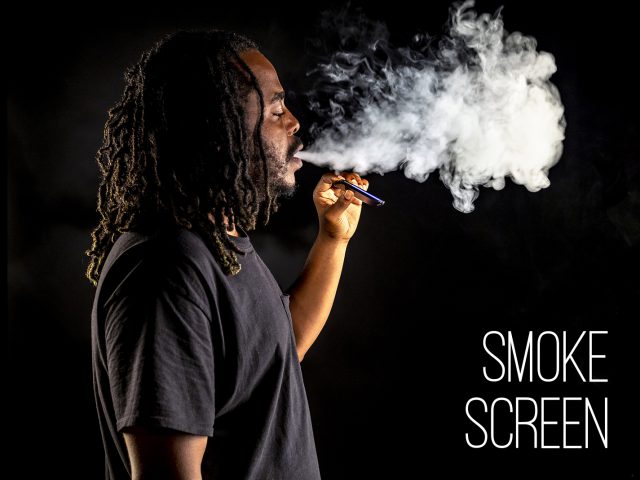| September, 18, 2019 | Gunner Young | campus editor |
|---|
Vaping has become a hugely popular trend among today’s high school and college population. Seen by many as a healthier alternative to cigarettes, the recent string of deaths caused by electronic cigarette-related lung damage caused many TCC students to think twice about their habit.
According to the Center for Disease Control, there have been over 300

cases and six deaths in the United States of lung illnesses caused by vaping. Though the exact cause for the complications is not yet known, most of the victims admitted to vaping e-cigarette product containing THC.
The CDC website states that “The investigation has not identified any specific e-cigarette or vaping products (devices, liquids, refill pods, and/or cartridges) or substance that is linked to all cases.”
Despite its relative mystery, TR student Nishara Mitchell said people can’t trust everything they see online.
“I will definitely continue vaping,” Mitchell said. “There is a lot of misinformation floating around. Counterfeit THC cartridges are not in the same category as nicotine cartridges.”
According to the New York Health Department, the leading suspect in the illnesses isn’t the THC or vape flavoring, but an excess of vitamin E acetate that is used as a thickening agent in both THC oils and specifically the candy flavored oils.
In the wake of the deaths, the Trump administration said that it moved to ban flavored vape products in order to curb the youth appeal for e-cigarettes.
“Nobody wants to see children becoming addicted to nicotine and we will continue to use our regulatory authority thoughtfully and thoroughly to tackle this public health crisis,” acting FDA commissioner Ned Sharpless told USA Today.
The issue among TCC students is not the potential dangers of vaping, but the health risk of smoking as opposed to vaping. NW student Carlos Monsante was a former smoker before he learned about a safer alternative to cigarettes.
“I’m not going to quit [vaping],” Monsante said. “If I were to quit, I would just go back to cigarettes.”
This proposed ban also brings up the lack of a cigarette ban, which according to Mitchell, is a much more imminent threat.
“I find it peculiar that cigs are legal, though they kill almost 400,000 people a year,” Mitchell said. “Yet only six people have died from vaping and now its being banned?”
The FDA cites flavored oil as a main reason teens and young adults pick up vaping, and plans to target that with the proposed ban. Flavors like bubble gum, sour candy and strawberry coming in bright, colorful packaging. While buyers must be 18 years or older to enter vape stores, the shelves look more like that of a candy store than a nicotine dispensary.
NW student Alexis Choulapane says that marketing a potential nicotine dependency as cute and colorful is a bad idea.
“I agree with banning flavored vape cigs as nicotine should not be promoted as something enjoyable,” Choulapane said.
Despite this, she plans to continue vaping for reasons that e-cigarette were invented for in the first place: to quit smoking.
“Yes, I do plan on vaping from time to time until I can quit nicotine since I was a smoker of cigarettes previously,” Choulapane said.
She also thinks that the best thing one can do to vape safely is to do your research.
“The public is misinformed about the harm that these things can do,” Choulapane said. “And a majority of teens are led by trends that adults are saying are harmless.”































